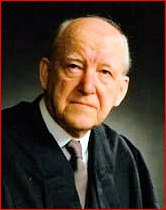 Transcript from a Conference Question and Answer Session with Dr. R. C. Sproul – Pittsburgh, 2000
Transcript from a Conference Question and Answer Session with Dr. R. C. Sproul – Pittsburgh, 2000
Questioner to Dr. R. C. Sproul: “How do you feel about the Vatican and its doctrine? Can you believe in this and still be saved?”
RC Sproul: “If they are asking ‘Can you be a member of the Roman Catholic Church and be saved?’ I would say ‘without question, Yes.’ If you understand fully the doctrines of the Vatican and embrace them, then I would say ‘No you can’t.’
That’s because to embrace the teaching of Rome, clearly understood, you would have to repudiate the gospel – particularly the doctrine of justification by faith alone, which contrary to the press releases of the accord with the Lutherans and all of that, the Roman Catholic Church has not changed its teaching from the Council of Trent one bit. The Council of Trent (the middle of the 16th Century) was where they set forth their condemnation of the Reformation view of justification and set forth the expression of their own doctrine of justification.
Questioner: “which is?”
R C Sproul: “well its complicated.. but real quickly, the doctrine of justification in Rome involves several elements. It begins with baptism (sacramentally) where in the sacrament of baptism, justifying grace is infused into the soul of the recipient (its called the righteousness of Christ). It is infused ex opere operato (through the working of the sacrament). That infusion of grace places the infant in a state of grace and two things have to happen: one, they must cooperate with that grace and assent to that grace to be justified, (coopere et assentara are the exact words of Trent) to such a point that righteousness inheres in the soul for them to be saved. Now as long as righteousness inheres in the soul, you are in a state of justification (you are in a state of grace) until or unless you commit mortal sin.
Mortal sin is called mortal sin because it kills the grace of justification in your soul. Now here’s also what is spelled out at Trent – you can commit mortal sin while you still have authentic faith – so you can have faith and not have justification – so faith alone will never suffice. They are not saying that you will be justified without faith because they require that you have faith and faith performs three functions. Faith is determined at Trent to be the fundamentum (the foundation), the initium (the initiation), and the rodex, the root of justification – so you’ve got to have faith, but faith alone will not do it.
Now if you commit mortal sin, you don’t get re-baptized, even though you have lost the grace of justification, you go to the second plank of justification which is the sacrament of penance, defined by Trent as the sacrament for those who have made shipwreck of their souls. In the sacrament of penance you have to make confession, you have to get priestly absolution, and then you have to do your works of satisfaction which are necessary to gain meritum de congruo (or congruous merit) – merit that does not oblige God to redeem you but makes it fitting for God to restore you to a state of grace… and as long as you stay then in that state of grace and you have inherent righteousness (righteousness that is in you) then you will be saved.. but if you die with any impurity on your soul, you go to purgatory (the purging place) until the impurity is removed.
The Protestant and I believe biblical view is that the moment you put your faith and trust in Jesus Christ all that He is and all that He has becomes yours in the sight of God, and that the righteousness by which we are justified is not our inherent righteousness but strictly and solely the righteousness that Luther said is extra nos (outside of us) a iustisium alienum, an alien righteousness, somebody else’s righteousness, that’s the gospel, that what saves me is not my inherent righteousness but the righteousness of Christ that was performed in His life, not in my life, in His life, and the moment I put my faith and trust in Him, I am redeemed forever.
I don’t have to worry about purgatory, I don’t have to worry about works of congruous merit, I don’t have to worry about inherent righteousness – I mean God is going to make me inherently righteous in heaven, but my justification does not rely upon that. It is not the gospel to go tell people, here, the grace of God will help you become inherently righteous, why don’t you come and join our church and we will give you the sacrament of grace to help you. That’s not the gospel.”
Notes: Here are some quotes from the Catholic Catechism:
On Merit:
“With regard to God, there is no strict right to any merit on the part of man. Between God and us there is an immeasurable inequality, for we have received everything from him, our Creator” (CC, 2007).
“The merit of man before God in the Christian life arises from the fact that God has freely chosen to associate man with the work of his grace. The fatherly action of God is first on his own initiative, and then follows man’s free acting through his collaboration, so that the merit of good works is to be attributed in the first place to the grace of God, then to the faithful. Man’s merit, moreover, itself is due to God, for his good actions proceed in Christ, from the predispositions and assistance given by the Holy Spirit” (CC, 2008).
“Since the initiative belongs to God in the order of grace, no one can merit the initial grace of forgiveness and justification, at the beginning of conversion. Moved by the Holy Spirit and by charity, we can then merit for ourselves and for others the graces needed for our sanctification, for the increase of grace and charity, and for the attainment of eternal life” (CC, 2010).
On Forgiveness of Sins
“Our Lord tied the forgiveness of sins to faith and Baptism. . . . Baptism is the first and chief sacrament of forgiveness of sins because it unites us with Christ, who died for our sins and rose for our justification, so that ‘we too might walk in newness of life'” (977).
“When we made our first profession of faith while receiving the holy Baptism that cleansed us, the forgiveness we received then was so full and complete that there remained in us absolutely nothing left to efface, neither original sin nor offenses committed by our own will, nor was there left any penalty to suffer in order to expiate them… Yet the grace of Baptism delivers no one from all the weakness of nature” (CC, 978).
Justification: See CC, 1990-91.
“Justification is conferred in Baptism, the sacrament of faith. It conforms us to the righteousness of God, who makes us inwardly just by the power of his mercy. Its purpose is the glory of God and of Christ, and the gift of eternal life” (CC, 1992).
“…justification entails the sanctification of his whole being” (CC, 1995).

 “I WILL sprinkle clean water on you, and you shall be clean from all your uncleannesses, and from all your idols I WILL cleanse you. And I WILL give you a new heart, and a new spirit I WILL put within you. And I WILL remove the heart of stone from your flesh and give you a heart of flesh. And I WILL put my Spirit within you, and CAUSE YOU to walk in my statutes and be careful to obey my rules.” – Ezekiel 36:25-27
“I WILL sprinkle clean water on you, and you shall be clean from all your uncleannesses, and from all your idols I WILL cleanse you. And I WILL give you a new heart, and a new spirit I WILL put within you. And I WILL remove the heart of stone from your flesh and give you a heart of flesh. And I WILL put my Spirit within you, and CAUSE YOU to walk in my statutes and be careful to obey my rules.” – Ezekiel 36:25-27 (1) Ligonier is having its BIGGEST ONE DAY SALE OF THE YEAR in TODAY’S $5 Friday sale. There are many EXCELLENT deals and I particularly recommend “What Is Reformed Theology?” DVD series, normally $60, the “What Did Jesus Do?: Understanding the Work of Christ” DVD series, which is normally $48, “Dealing with Difficult Problems” CD set, normally $24, and “The Truth of the Cross” Audio Book, normally $15, all by Dr. R. C. Sproul.
(1) Ligonier is having its BIGGEST ONE DAY SALE OF THE YEAR in TODAY’S $5 Friday sale. There are many EXCELLENT deals and I particularly recommend “What Is Reformed Theology?” DVD series, normally $60, the “What Did Jesus Do?: Understanding the Work of Christ” DVD series, which is normally $48, “Dealing with Difficult Problems” CD set, normally $24, and “The Truth of the Cross” Audio Book, normally $15, all by Dr. R. C. Sproul.  (2) An Encouraging testimony from England:
(2) An Encouraging testimony from England: (4) Speaking of Dr. Martyn Lloyd-Jones, when I entered the Christian ministry, my father invested in me by buying me many of his commentaries. As a preacher and pastor himself, he told me that outside of the Bible itself, these were the finest books in his personal library (a library he had built up over many decades). At the time, I did not realise the great treasure I had been given. However, in actually sitting down and reading his works, I find an incredible amount of spiritual “meat” for my soul on each page. There is little or no “fluff” whatsoever, just thorough exegesis of the text of Scripture as well as thoughtful and penetrating application. I cannot help feeling that he fed his people well.
(4) Speaking of Dr. Martyn Lloyd-Jones, when I entered the Christian ministry, my father invested in me by buying me many of his commentaries. As a preacher and pastor himself, he told me that outside of the Bible itself, these were the finest books in his personal library (a library he had built up over many decades). At the time, I did not realise the great treasure I had been given. However, in actually sitting down and reading his works, I find an incredible amount of spiritual “meat” for my soul on each page. There is little or no “fluff” whatsoever, just thorough exegesis of the text of Scripture as well as thoughtful and penetrating application. I cannot help feeling that he fed his people well. Here is some good insight from Kevin Deyoung.
Here is some good insight from Kevin Deyoung. An excerpt from Dr. R. C. Sproul’s book, Loved by God.
An excerpt from Dr. R. C. Sproul’s book, Loved by God.
 God’s love for the world was demonstrated by the giving of His Son so that all who believe in Him will in no way perish, but instead, have everlasting life.
God’s love for the world was demonstrated by the giving of His Son so that all who believe in Him will in no way perish, but instead, have everlasting life. Pastor John,40. The Pharisees loved the Bible but were not even saved. Don’t become like them.” I still believe I should study the Bible but his words ring in my ears as a constant dampener on the joy I feel when I look into God’s word. Is he right?
Pastor John,40. The Pharisees loved the Bible but were not even saved. Don’t become like them.” I still believe I should study the Bible but his words ring in my ears as a constant dampener on the joy I feel when I look into God’s word. Is he right?